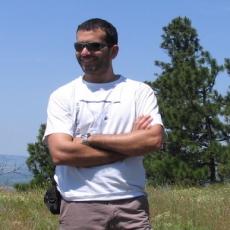Objectives
To provide basic knowledge on the biological implications of global change, from a macroecological perspective, a conservation perspective, and a sustainability perspective. To understand the effects of global change on biodiversity, and the links between environmental change, biodiversity loss, and risks to humanity. To interpret global change under a multi-scale lens, both temporally (past to future) and spatially (local to global).
Channels
NESSUNA CANALIZZAZIONE
 LUIGI MAIORANO Teacher profile
LUIGI MAIORANO Teacher profile
Programme
Module 1: Global change and its drivers
- what is global change
- human worldwide colonisation, defaunation in the anthropocene
- sixth mass extinction
- climate change
- socio-economics trends & land-use change
Module 2: How do species respond to global change?
- what is biodiversity?
- biodiversity response to global changes:
- phenology
- evolution
- geography
Module 3: Ecosystem response and impact on NCPs
- ecosystem-level and community level response
- what are NCPs?
- response of the NCPs + risk for humanity
- zoonotic disease risk
- climate risk (flooding, droughts, inundation, heatwave etc)
- fire (climate + land-use change)
- pests (locusts)
- crops and pollination
Module 4: Solutions
- Action (management + societal)
- Rewilding, Restoration, Protected Areas
- Societal Change & Bending the Curve
- Policy
- UNFCCC, Paris Agreement
- Convention on Biological Diversity + EU Green Deal + Common Agricultural Policy
- Sustainable Development Goals + One Health
Module 5: Thematic seminars
Adopted texts
Erica Bree Rosenblum (2021) Global Change Biology 1st ed. Oxford University Press
Bibliography
Lee Hannah 2021. Climate change biology. Academic Press Thomas E. Lovejoy & Lee Hannah. 2005. Climate change and Biodiversity. Yale University Press Bibliographic material (papers and reports) will also be provided during the course
Prerequisites
None
Exam modes
- seminars presentations + written examination (attending students)
- written examination (non-attending students)
 MORENO DI MARCO Teacher profile
MORENO DI MARCO Teacher profile
Programme
Module 1: Global change and its drivers
- what is global change
- human worldwide colonisation, defaunation in the anthropocene
- sixth mass extinction
- climate change
- socio-economics trends & land-use change
Module 2: How do species respond to global change?
- what is biodiversity?
- biodiversity response to global changes:
- phenology
- evolution
- geography
Module 3: Ecosystem response and impact on Nature's Contributions to People
- ecosystem-level and community level response
- what are NCPs?
- response of the NCPs + risk for humanity
- zoonotic disease risk
- climate risk (flooding, droughts, inundation, heatwave etc)
- fire (climate + land-use change)
- pests (locusts)
- crops and pollination
Module 4: Solutions
- Action (management + societal)
- Rewilding, Restoration, Protected Areas
- Societal Change & Bending the Curve
- Policy
- UNFCCC, Paris Agreement
- Convention on Biological Diversity + EU Green Deal + Common Agricultural Policy
- Sustainable Development Goals + One Health
Module 5: Thematic seminars
Adopted texts
Erica Bree Rosenblum (2021) Global Change Biology 1st ed. Oxford University Press
Bibliography
Lee Hannah 2021. Climate change biology. Academic Press Thomas E. Lovejoy & Lee Hannah. 2005. Climate change and Biodiversity. Yale University Press Bibliographic material (papers and reports) will also be provided during the course.
Prerequisites
NA
Exam modes
- seminars presentations + written examination (attending students)
- written examination (non-attending students)
| Exam reservation date start | Exam reservation date end | Exam date |
|---|---|---|
| 13/01/2022 | 27/01/2022 | 01/02/2022 |
| 14/02/2022 | 03/03/2022 | 07/03/2022 |
| 10/04/2022 | 22/04/2022 | 27/04/2022 |
| 30/05/2022 | 12/06/2022 | 15/06/2022 |
| 20/06/2022 | 04/07/2022 | 08/07/2022 |
| 29/08/2022 | 09/09/2022 | 12/09/2022 |
| 26/09/2022 | 05/10/2022 | 10/10/2022 |
| 21/10/2022 | 07/11/2022 | 14/11/2022 |
- Academic year: 2021/2022
- Curriculum: Curriculum unico
- Year: First year
- Semester: First semester
- SSD: BIO/05
- CFU: 6
- Attività formative affini ed integrative
- Ambito disciplinare: Attività formative affini o integrative
- Lecture (Hours): 48
- CFU: 6
- SSD: BIO/05
